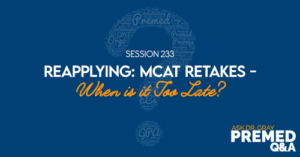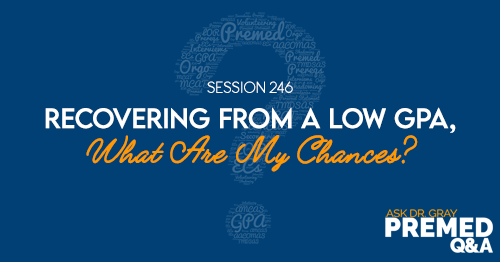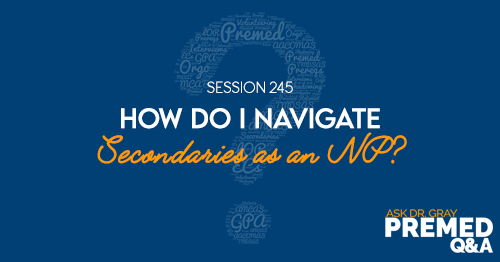Apple Podcasts | Google Podcasts
Session 233
This student needs to reapply to med school and retake the MCAT. They already have a standing MCAT score. They want to know when it’s too late for them to retake the test.
Ask Dr. Gray: Premed Q&A is brought to you by Blueprint MCAT. Listen to this podcast episode with the player above, or keep reading for the highlights and takeaway points.
The episodes in this podcast are recordings of our Facebook Live that we do at 3 pm Eastern on most weekdays. Check out our Facebook page and like the page to be notified. Also, listen to our other podcasts on MedEd Media. If you have any questions, call me at 617-410-6747.
Question of the Day: When Is It Too Late to Take the MCAT?
This student asks:
“I applied this cycle, and I got waitlisted at two schools. But while I was waiting to hear back from one of them, it started creeping into that time period where it was: Do I reapply? Do I need to retake the MCAT? And I wasn’t sure if I should start studying all over again and how much time to give myself.
I gave myself three months before applications would open again, to start studying for the MCAT. But then I started running into this problem where I felt a little bit pressed for time. I didn’t think that I was really ready for the MCAT.
How late can I take the MCAT given that I already have a score? What is considered too late after I resubmit my applications to retake the MCAT?”
Is It Really MCAT That You Need to Improve?
Aiming for a higher MCAT score is often seen as beneficial, but it’s important to avoid a knee-jerk reaction of solely focusing on improving that score. Sometimes, the MCAT may not be the root issue.
Even if your scores were within range for most schools, there could still be variations in the selection process, where certain schools may prioritize different criteria. Relying solely on statistics to apply to medical schools can be misleading. That’s because we don’t have insight into how schools interpret and use the data, including MCAT scores and GPAs, during their decision-making process.
“A higher MCAT score always helps.”Click To TweetWith so many variables at play, the MCAT score does hold significance, but it’s crucial not to overlook other factors that may impact your application.
Considerations for MCAT Test Dates and Application Timelines
Evaluating the Impact of MCAT Test Dates
When planning your MCAT test date, it’s crucial to consider how it may affect your medical school application timeline.
While a later MCAT score typically doesn’t directly harm your application, it can hinder the progress of completing other application components. This includes writing essays, securing letters of recommendation, and working on activity descriptions.
The quality of your essays may be compromised if MCAT preparation becomes a distraction. Therefore, striking a balance between application readiness and MCAT preparedness is essential.
Timing and Application Completion
For AMCAS schools, the application cycle begins in May, with submissions opening at the end of May or early June. Applications are then verified and sent out to schools by the end of June. Secondary applications are typically received by mid-July, along with primary applications, letters of recommendation, and MCAT scores.
Considering this timeline, an end-of-June MCAT test date may delay your application by two weeks at most. This is generally inconsequential in the overall admissions process. Admissions committees may also have some downtime during this period, allowing for a slight buffer.
Factors Affecting Different Application Services
While the impact of a later MCAT test date is minimal for AMCAS, it may have slightly more influence on TMDSAS and AACOMAS applications. TMDSAS operates on a faster timeline, and AACOMAS has introduced changes that may affect when secondaries are sent out.
However, historically, AACOMAS has accepted January MCAT scores, indicating a more flexible approach. Ultimately, prioritizing readiness and avoiding rushing the MCAT due to application concerns is crucial for long-term success.
Making Informed Decisions: Retaking the MCAT and Maximizing Your Application Potential
The MCAT is just one aspect of your application.
Committing to a clear plan is crucial when considering whether to retake the MCAT or not. If you choose not to retake the exam and reapply with the same score, medical schools will evaluate your application based on the information they had from the previous cycle. However, it’s important to recognize that the MCAT score is just one aspect of your application.
'Make sure that you're not focusing too much on the MCAT when there's something else staring you right in the face.'Click To TweetDo some self-reflection.
Reflecting on what other areas of your application can be improved and taking steps to enhance them since the last cycle is essential. This includes identifying any weaknesses, such as experiences, essays, or letters of recommendation, and actively working on them to present a stronger overall profile.
Don’t just half-commit.
If you do decide to retake the MCAT, ensure that you fully commit to the process and plan accordingly, avoiding any half-hearted attempts. Ultimately, the goal is to present yourself in the best possible light and give schools a fresh perspective on your candidacy.
Links:
Medical School HQ Facebook page
Medical School HQ YouTube channel
Instagram @MedicalSchoolHQ
Join the Application Academy!
The Premed Playbook: Guide to the Medical School Personal Statement
The Premed Playbook: Guide to the Medical School Application Process
SEARCH SITE
LISTEN FOR FREE












